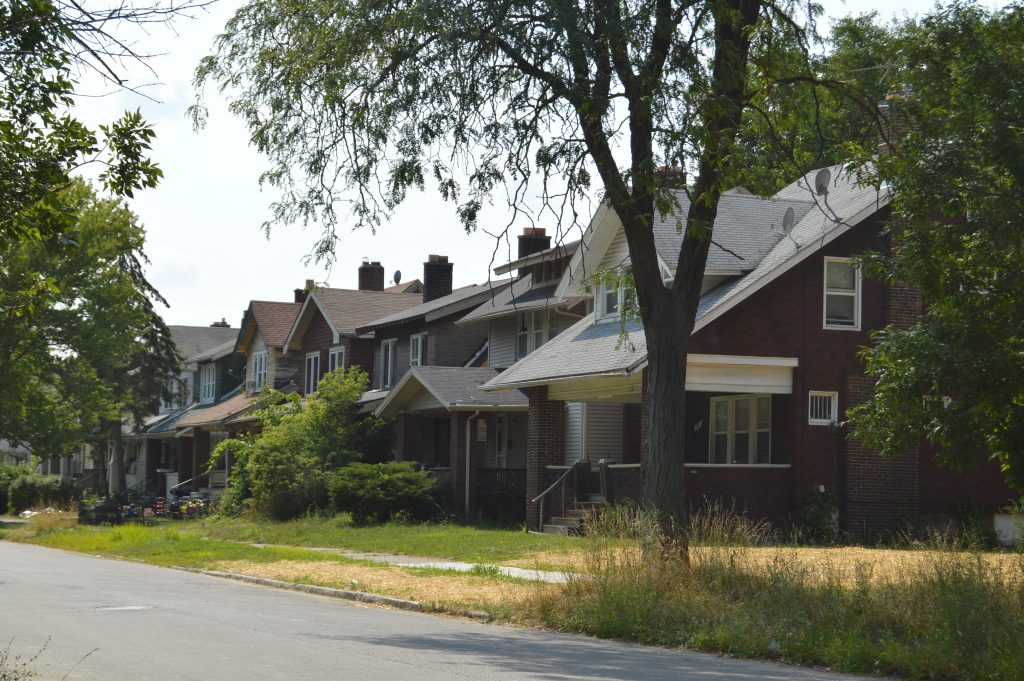For Ex-Offenders, Housing is a Bigger Hurdle Than Employment
Lacking housing means reduced stability for returning citizens, and a lack of stability contributes to many people returning to actions that got them in prison in the first place.

Highland Park
Housing, particularly “affordable housing” has been a hot topic in communities across Michigan.
Formerly incarcerated people, or “Returning Citizens” as they are called by advocates, have an especially difficult time finding stable housing across Michigan and across the nation.
Click on the audio player above to hear MichMash discuss the struggle for ex-offenders to find housing in Michigan.
The challenge of ex-offenders finding housing impacts recidivism. Housing means stability, and a lack of stability contributes to many people returning to their old ways that got them in prison in the first place. Without the ability to stand on their own feet and fully reintegrate into society, many ex-offenders will commit new crimes and find themselves back in prison.
Read More: Ex-offenders struggle to find housing in Grand Rapids’ hot market
Currently, the statewide recidivism rate is 29.1 percent, according to Michigan Department of Corrections spokesman, Chris Gautz. While it’s one of the lowest rates in state history, it still puts Michigan in the top 10 nationally.
“If they don’t have (housing), that is all they’re going to be worried about. ‘Where am I sleeping tonight?’” – Angie Sprank, Community Coordinator Region 4 Offender Success Program.
This comes after MDOC made a concerted effort to focus on assisting ex-offenders when they get out of prison through programs like Offender Success and the Vocational Villages. In the past those programs have focused on employment. But now, advocates say it’s time to focus on housing.
“They can walk out of prison and get a job that same day,” said Angie Sprank, Community Coordinator Region 4 Offender Success Program.
“But if they don’t have (housing), that is all they’re going to be worried about. ‘Where am I sleeping tonight?’ ‘If I’m at the mission, am I going to get down there in time to be in line for a bed?’ It all starts with just having that stable piece of a home.”
Some of the obstacles that ex-offenders face when looking for housing include:
- The general lack of affordable housing options that most low-income people encounter.
- The stigma of having a criminal record scares off many landlords who could rent to others instead.
- The lack of financial-support programs or vouchers available to those who have committed certain felonies and some misdemeanor crimes.
There are several programs that MDOC has in order to help ex-offenders find housing, one of the big ones being the Offender Success Program. But they run into problems when it comes to finding people willing to rent to ex-offenders.
The Offender Success Program keeps a list of landlords that are willing to rent rooms to parolees, but that list isn’t as long as it needs to be, Sprank said.
But there are some people, like Shellie Cole-Mickens who are willing to rent exclusively to ex-offenders. Cole-Mickens, an ex-offender herself, runs five houses called House of Blessings where she only allows women who have been incarcerated to stay.
“Public safety is No. 1 for us. But also it’s restoration of lives.” – Ben Rosa of 70 x 7 Life Recovery.
It’s not just a criminal record that can get in the way of ex-offenders finding housing. Another problem is having an eviction on their rental record. Many ex-offenders at one time or another were evicted, and that’s a mark on their rental history that doesn’t go away. Another big hurdle, having a complete lack of rental history for months and years at a time.
Advocates argue that it’s in the best interest of everyone in the state to find ex-offenders stable, affordable housing. They say it’s in the interest of public safety, but fewer people in prison also means less money spent on incarceration.
Ben Rosa works for 70 x 7 Life Recovery. He said they work with law enforcement because the police realize that keeping ex-offenders on the right track is good for the community as a whole.
“Public safety is No. 1 for us,” Rosa said. “But also it’s restoration of lives.”
Support the news you love.
Here at WDET, we maintain our journalistic integrity through independent support from readers like you. Because you value WDET as your source of news, music, and conversation, please make a gift today.
